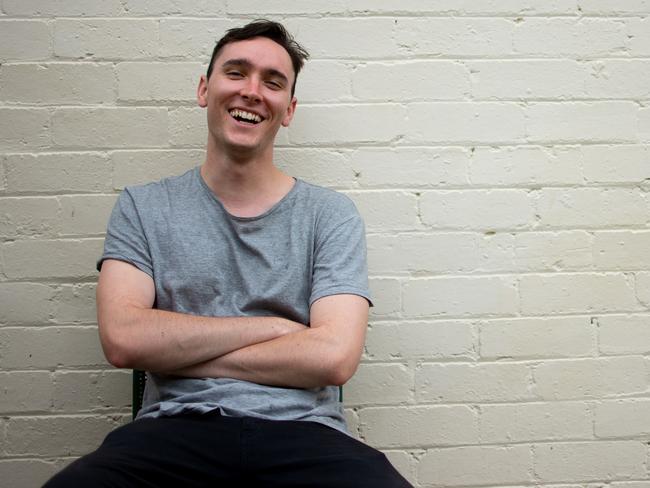Mental health: How Covid has affected different ages, genders, job sectors
All ages, genders and professions have been affected by the pandemic. If your mental health is suffering, you are not alone.
SmartDaily
Don't miss out on the headlines from SmartDaily. Followed categories will be added to My News.
The Covid-19 pandemic has exacerbated mental health struggles for many Australians, but a silver lining is that it has also brought the once-taboo topic further into the open.
Whether it is isolation from friends and family, the stress of home schooling or economic uncertainty, not many people have been untouched over the past 18 months.
New research from mental health organisation WayAhead reveals how the pandemic has affected different parts of the community and shows anyone who is struggling that they are not alone.
ALL AGES
Younger Australians have been especially affected, but all generations have struggled.
The WayAhead survey shows respondents aged 18 to 24 are most likely to have experienced stress and anxiety (60 per cent report this), difficulty concentrating (37 per cent), a decline in productivity (45 per cent), negative thoughts (48 per cent) and loneliness (53 per cent) during the pandemic.
Meanwhile, those aged 25 to 34 are most likely to have had difficulty switching off (36 per cent) and those aged 45 to 54 are most likely to have struggled with sleep (41 per cent).
The most common issues among older demographics are stress and anxiety (46 per cent of people 55 to 64) and loneliness (28 per cent of people 65 plus).

WayAhead mental health promotion and program manager Asha Zappa says social connection is crucial to wellbeing, particularly for younger people.
“The research also indicated they were negatively impacted by job security concerns with many young people studying and working in businesses and sectors that were the most impacted by the pandemic – retail and hospitality,” they say.
Zappa says fewer older Australians reported issues and this may be partially explained by their stage of life.
“Although the pandemic created a stressful and unusual environment, (typically) their daily tasks and lives remained similar – working, caring for family, cooking and exercising,” they say.
ALL SECTORS
People’s mental health has been affected in different ways depending on their line of work, according to the research.
For example, job security anxiety has been particularly strong among sport (67 per cent report this) and hospitality (53 per cent) employees, but working from home has had the most significant effect on people in science and technology (39 per cent).
Meanwhile, community services workers (27 per cent) are most likely to “totally agree” they have increased their consumption of alcohol or recreational drugs to cope with the pandemic.
WayAhead mental health expert Stephanie Thompson says people who have lost jobs have faced financial stress while those who transitioned from an office to a home environment have experienced their own challenges.
“The social interaction is not the same as if it were in person, and we are relying on technological video calls and virtual conferring for that social interaction,” she says.
“The lack of social cues and ability to understand performance can lead to overworking and setting unrealistic expectations that can lead to burn out.
“The lack of separation between home and working environments can often make it difficult for people to switch off.”

ALL GENDERS
Although roughly the same portion of men (81 per cent) and women (85 per cent) report a deterioration in their mental health over the past 18 months, the research finds women are more likely to have spoken to someone about their struggles.
Almost two in five men (38 per cent) keep feelings to themselves, compared to 22 per cent of women.
Men are less likely to have spoken to their partner (40 per cent versus 45 per cent), a family member (21 per cent versus 31 per cent), a friend (20 per cent versus 38 per cent) or a professional (7 per cent versus 11 per cent).
An Australian tech start-up is aiming to address men’s “she’ll be right” attitude towards mental health by providing convenient and discreet telehealth services.
Online platform Mosh offers one-on-one doctor consultations, medication prescriptions and psychology services via text, call or video call.
Mosh co-founder Gabriel Baker says men typically neglect their mental health even if they’re struggling, and don’t seek out the resources that are available for them.
“We need to change the stigma surrounding seeking help and encourage a more open conversation surrounding mental health care,” he says.
Jordan Broadway, of Northcote in Victoria, has struggled with his mental health on and off for more than a decade and although it is now under control, he still has bad days – particularly during extended lockdowns.
“I have sought help before, during a handful of particularly challenging periods, but hadn’t been able to find the right practitioner, whether a counsellor or psychologist, who I felt comfortable enough to fully open up to,” he says.
“Last year I realised I really needed to try again, but I couldn’t find mental health support in person.”
Broadway, 26, joined Mosh and began accessing support from the comfort of his bedroom.
“The first psych I tried with Mosh wasn’t the right fit for me, and they made it so easy for me to find another one who ended up being just what I had been looking for,” he says.

HEALTHY WAYS WE COPE
How Australians have tried improving their mental wellbeing during the pandemic
SOURCE: WayAhead
Exercising 52 per cent
Cooking 33 per cent
Speaking to friends and family 33 per cent
Gardening 28 per cent
Creating a routine 28 per cent
Self pampering 17 per cent
Meditation 16 per cent
Retail therapy 13 per cent
A new hobby 13 per cent
Counselling/professional help 11 per cent
Study/development 10 per cent
Dressing up 7 per cent
Journaling 6 per cent
If you or anyone you know needs help:
Lifeline: 13 11 14
Beyond Blue: 1300 22 4636
Kids Helpline: 1800 55 1800
Originally published as Mental health: How Covid has affected different ages, genders, job sectors




